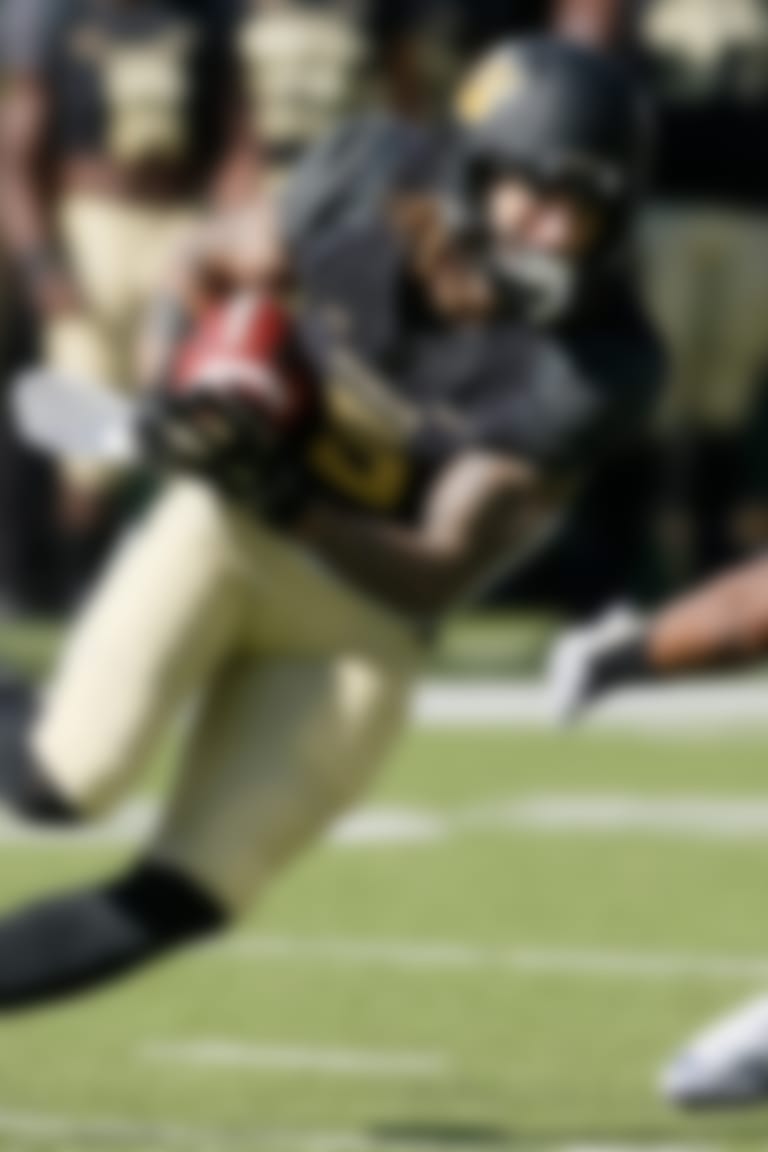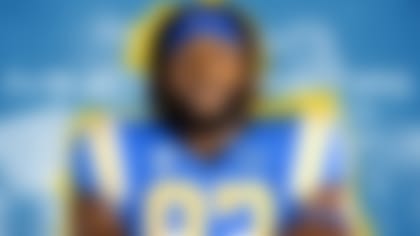Why Jalen Hurd -- once one of the nation's top running back prospects -- risked millions of dollars by switching schools and positions just six months before the draft
By Chase Goodbread | Published Nov. 28, 2018
WACO, Texas -- Some saw a weight lifted from Jalen Hurd's shoulders they knew was a long time coming. Others sat there, in a team meeting room at the University of Tennessee's Anderson Training Center, and thought they were listening to a blueprint for career suicide. Or maybe just selfishness.
Perhaps all of those perceptions were true. But Jashon Robertson only saw his best friend in pain.
UT's 2016 season was reeling from its third consecutive SEC loss, and it was about to reel even more. Hurd, the school's star running back, had decided to clean out his locker and leave the program at a time of year when no NFL draft prospect in his right mind would.
In October.
With four games still left on the schedule.
With the Volunteers desperately needing a turnaround to save the season.
And with the 2017 NFL Draft beckoning with big money.
The timing, however, wasn't the only bizarre aspect to a decision that rocked Rocky Top to its core. Hurd also had convinced himself, after playing running back his entire life, that a switch to wide receiver was the smartest thing for his NFL future. Against all the sane advice he could stand, he not only left his team at midseason, he left behind the position that had been his golden ticket, as well.
What some called crazy, to Hurd was just bold.
They saw a folly that could cost him millions; he saw a necessary course correction.
When a full team meeting broke the day after Hurd lost his last shred of tolerance for Tennessee football, about a dozen players he felt closest to stayed behind at his request. Hurd stepped to the front of the room, and in an outpouring that lasted about 10 minutes, told them what he would tell coach Butch Jones a day later -- that the rest of the season was theirs to save.
He had himself to save.
"He was drowning," said Robertson, Hurd's three-year roommate at Tennessee and his closest confidant on the team. "When you see someone in the state he was in, it's not about ball anymore. His spirit was drowning."
Coming up for air meant ripping his NFL resume in half six months before he would have been drafted as one of the nation's most gifted running backs.
The decision left scouts to start over with a blank sheet of paper, and left Hurd with just one season to fill it in. Growing up a UT fan, he couldn't have fathomed signing with the home-state Vols as a five-star recruit only to end up a fifth-year wide receiver at Baylor, trying to re-establish his draft standing against a fast-ticking clock. But that's where he found himself in 2018 -- performing in the obscurity of a middling program that had to push a re-start button of its own.
If he could go back in time, it wouldn't have gone down quite the same way. But it's easy to look forward when there's so much to leave behind.
While the fiery aftermath of Hurd's untimely exit scorched earth in Tennessee, Hurd was freezing and bundling up with his warmest clothes. He spent the rest of the 2016 football season holed up as a guest of one of his best friends, Nathan Xander, in the River Forest Apartments in Richmond, Va.
For nearly four weeks, tucked at the foot of the Blue Ridge Mountains amid a constant snowfall, he laid around Xander's apartment and tried to clear his head with anything but thoughts of football. He binge-watched a season of "Friends," lost himself in "Battlefield" on Xbox, and crashed on an air mattress at night. A week earlier, he'd been entrenched in Tennessee's in-season football regimen; now he was reduced to catching poorly thrown passes from Xander in a snow-covered parking lot. For the rest of the season, he didn't even watch college football on Saturdays.
Nobody in Richmond recognized him, and he loved it.
He largely kept his phone off during that period, but Xander, a UT graduate, noticed him glance at it enough to assume he was aware of the unbridled anger awaiting him on social media. He put out a statement on Twitter explaining why he had packed his bags but wasn't worried about how it would be received.
He was at peace with leaving UT from his first knock on Xander's door.
"It was a relief for him," Xander said. "He never said, 'What have I done?' or dreaded the backlash. Jalen leaving Tennessee had been a long time coming."
By the time Hurd left the seclusion of Xander's apartment, he'd decided to train for his new position in California and made his first official visit to Cal in search of a transfer destination. He followed with visits to Ohio State and Louisville, but ultimately chose Baylor, the last of his stops, for two key reasons. One, he sensed trustworthiness in head coach Matt Rhule that he had long since lost with Butch Jones. And two, he'd had his fill of the over-the-top, all-consuming nature of UT fan fervor, and the scrutiny that emanated from it.
Ohio State certainly would have been no escape from that. In Baylor, however, Hurd found an environment that was, while passionate, a little less crazed. Waco didn't lose as much sleep over a loss as Knoxville did, and that was just fine with a kid who, as a recruit, was corralled into autographs and selfies with strangers before he'd ever even played a down for the Volunteers. Just hours after seeing the school for the first time, he phoned the coaching staff and let them know his transformation as a wide receiver would come as a Bear.
Hurd's radical career move wasn't the knee-jerk response of an impetuous star; his relationship with Jones had been strained for almost two years, and his relationship with the running back position had been strained for almost two months.
On the Friday morning following the Volunteers' season-opening 20-13 win over Appalachian State, Hurd's entire body ached like it was the end of the season, not the beginning. He wasn't injured, but he went to the training room for standard post-game treatment with an uneasy feeling about his future as a running back.
"I took a different impact in that game than I'd ever taken in my life," he said. "I took a mental note of it. I had taken punishment like that before but had never felt that way afterward. I had just come out of training camp, feeling fresh, feeling strong. I shouldn't have felt like that after one game."
And with that, a two-year frustration with pounding inside-zone runs between the tackles -- a primary reason he and Jones never saw eye to eye -- began to correlate with the pains and injuries Hurd sensed accumulating on his 240-pound frame. He began researching the longevity of NFL running backs and found it to be a short career. As a wide receiver, he could see himself playing much longer.
He's not alone in the frustrated running back club.
Steelers running back Le'Veon Bell sat out 2018, foregoing $14.5 million in a contract dispute that stemmed from the wear-and-tear he feared for his body. The nation's top high school running back recruit, Quavaris Crouch of Charlotte, N.C., switched to linebacker over concerns about the way his former position is trending. Seven-time Pro Bowler Adrian Peterson, according to the Washington Post, not only endorsed Crouch's decision but said he wouldn't play running back either, with the benefit of hindsight.
Over the first eight Tennessee games of 2016, Hurd did the same math Crouch did and both arrived at the same answer. But Crouch abandoned the running back position with an entire college career ahead of him; Hurd did it with a promising NFL career within his grasp.
"He wouldn't have been in the discussion with (Leonard) Fournette and (Christian) McCaffrey at the top of that draft," said an AFC scout. "But he's such a good athlete for his size, he would have been right there on that next tier."
That tier included Dalvin Cook, Joe Mixon, Kareem Hunt, James Conner, and the very player some Tennessee players wanted over Hurd in the Vols backfield: Alvin Kamara.














